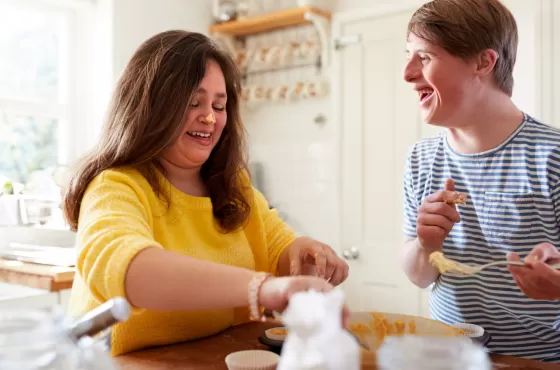Never fear – we’re making it our mission to tell you everything you need to know about Supported Independent Living (also known as SIL) in this article.
The purpose of Supported Independent Living SIL
We like to think of SIL as an incredibly empowering support for many NDIS participants. Here’s why:
It offers independence
As the “I” in SIL would suggest, independence is key. Supported Independent Living staff work with you to develop your skills and confidence in managing your own life, making your own choices, and achieving your goals.
Support all the time
Qualified staff are present 24/7 to assist with your daily needs. This includes personal care, household tasks, medication, and community participation.
Shared living
Most (but not all) SIL arrangements are shared, meaning you get to live in a house with other NDIS participants. While this may take some getting used to, shared houses are wonderful once you settle in. Having housemates fosters deep connections, peer learning and support, and a sense of belonging – it’s like having another family!
Looking for a SIL provider you can depend on? Be supported in a family-style home by skilled support staff
Is Supported Independent Living right for me?
SIL is designed for people with disability who require a high level of support. If you want to increase your independence, SIL could be a good option.
The Supported Independent Living Process
1) Access SIL funding
Eligibility for SIL funding starts with an NDIS assessment. They'll evaluate your needs and goals to see if SIL fits within your plan. They’ll also check whether SIL is the most appropriate and cost-effective support for your needs when compared with other options. Check out our article all about accessing SIL funding for more information on this part of the process.
2) Choosing your provider
Once approved for SIL, you can start looking for the best provider. We put together an article full of tips for choosing the perfect SIL provider, which you can read here.
Remember: under the NDIS, you have choice and control! You can be as rigorous in your selection process as you want. After all, the most important thing is selecting a SIL provider that aligns with your preferences and requirements.
3) Personalised support
Once you’ve chosen a provider, they’ll work with you to develop a support plan. This plan will detail exactly how your needs will be met and how you will be supported to work towards your goals.
4) Finding your home
Your SIL provider will help you find compatible shared housing and housemates that suit your lifestyle. This part of the process may take a while, but it’s worth being patient and visiting in-person as much as you can.
Advantages of Supported Independent Living
SIL has so many benefits. These include...
Greater independence
Get support to develop skills that will empower you to lead a more self-directed life.
Stronger community
Build long-lasting friendships, engage in social activities in a comfortable setting, and reduce feelings of isolation.
Increased choice
Shape your own support plan, make your own decisions, and have a say in the routine and lifestyle you build.
Enhanced safety
Have qualified support available around the clock to give you and your loved ones peace of mind.
Achieve your goals
Receive personalised and supportive assistance to work towards your unique ambitions.
Exploring your options
Want to know if SIL is the right fit for you? We recommend speaking with your NDIS planner or Support Coordinator. They will consider your unique circumstances and advise on the best options for you.
Key takeaway: SIL could be your pathway to greater independence as you work towards your goals in a supportive and safe environment.
Additional Resources:
Moving out or leaving the family home is a big decision. You and your loved ones may have a lot of questions, but we're here to help. If you have any questions, you can email live@ld.org.au, call 08 8256 9800 or fill out this form.
